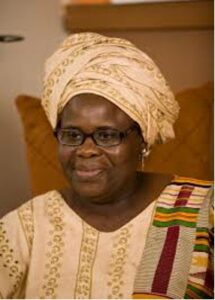
Photo Credit: The Business & Financial Times
HARARE, ZIMBABWE: While international honour and tributes for the African literary legend Professor Ama Ata Aidoo who died aged 81 on May 31, 2023 are still pouring, Zimbabwe will also bear everlasting memories of her inspiring character.
In Zimbabwe, she consolidated her writer’s voice, becoming a full-time writer.
Not only that, but when Prof Aidoo, best known as a prominent novelist, poet, playwright and feminist, came to Zimbabwe in 1983 she also became part of the Ministry of Education in the curriculum development department, naturally investing the experience she gained as Ghana’s Secretary for Education from 1982 to 1983.
Indeed, her ‘granary of wisdom and knowledge’, of which writer and activist Tsitsi Dangarembga tweeted Africa has lost (The Guardian), not only impacted the academia across the world through her profession but most profoundly through her literary works, which attracted literary criticism, particularly on postcolonial perspectives and representations of black women in African literature.
Many of her admirers have honoured Prof Aidoo by sharing her thought-provoking aphorisms on websites and blogs.
“We will miss Ama for her outspokenness and candor,” said Shimmer Chinodya. ” I especially enjoyed her Commonwealth Prize winning novel Changes.” Chinodya is also a previous winner of the same prize with his 1989 novel, Harvest of Thorns.
Changes: A Love Story, which is Chinodya’s favourite, is a widely reviewed novel dealing with African marriage, especially polygamy. The novel and her other play The Dilemma of a Ghost are considered her best works. In fact, Al Jazeera reported on May 31, 2023 that the novel and play ‘were taught to children in West African schools for decades.
Barbara C Nkala, one of Zimbabwe’s earliest and multi-award-winning female writers, was deeply saddened by the passing of her inspirational mentor.
In her tribute, Nkala said, “We come across all kinds of wonderful people in our lives who leave indelible footprints in our hearts. Then we sort of forget about them as our paths go their separate ways. But when they pass on and we hear about it, all kinds of fond memories flood our thoughts. When I learnt about the passing of Ama Ata Aidoo, I remembered with fondness her round face, her smile, and her loud voice. Ama Ata Aidoo from Ghana and Micere Mugo from Kenya were the big sisters who lived in our country in the 1980s and they were published authors that we admired.
Nkala revealed that Ama Ata was one of the founding members of Zimbabwe Women Writers.
“She and quite a few other international sisters that were writers were in our country as visitors or as persons in exile. I remember her for being fearless and candid. She was very encouraging, and she was a good mentor to some of us fledglings. Most of us were wowed by her forthright manner and the fact that she was hailing from academia and already had held the portfolio of Secretary for Education in her country in the early 1980s. I do not remember Ama Ata dressed in Western clothes. She always looked immaculate in her elegant Ghanaian attire of matching top, wrap, and headgear. It always made me feel sorry that as Zimbabwean women we did not really have a dress that we could be identified by.
“I shall never forget how after reading my small anthology of short stories in English, The Underdog and Other Stories Ama Atta said to me, ‘Ah Barbara, there is no hope for us women in these stories!’ Least flattering words from an accomplished writer. That set me thinking. Indeed, the stories were an awful sob. They were all a loud cry concerning the plight of women under patriarchy and paternalism in our nation. So, when I wrote the next set of short stories titled Eva’s Song, there was more humour and positivity. Ama Ata taught me that we do not have to sit on our laurels and cry bucketful tears. The young and other people will learn better from us when we offer solutions to the trials and tribulations and the dilemma we face. Ama Ata injected a spirit of positivity into those she engaged with and encouraged women to tell their own stories. What a shining legacy she left after the few years she interacted with various people in Zimbabwe. I am grateful to Ama Ata for what I learned from her. May she rest in eternal peace.”
One of her plays titled ‘Anowa’ was part of Almasi Collaborative Arts’ staged reading series. Directed by Sandra Chidawanyika-Goliath, the insightful staged reading of ‘Anowa’ at the Zimbabwe-Germany Society in December 2016 featured experienced and aspiring actors.
Many Zimbabwean writers will remember Prof Aidoo’s captivating stories they read and loved at their tender ages. However, to remember the stories is also to remember the striking image of the storyteller who was but a woman proud of her African-ness.
Tsitsi Nomsa Ngwenya, now a published author, said, “I first read a short story by Professor Ama Ata Aidoo when I was in Primary School. It was from a collection of her short stories, No Sweetness Here. The story made me feel like I have met the characters; the characters seemed so much alive and breathing one could touch them. I then watched a play she wrote. I was so inspired by her storytelling I wanted to read books only written by African Writers. She is one of the female writers who made me write; her bravery and ability to stand for what she believed in and her courage to tell those who continue to take from Africa to stop. I did not meet her in real life but I followed her Tedtalks, her Literary Contributions and always and always, felt inspired.”
Prof Aidoo’s child characters truly speak to something hidden in every child but they also inspire adults. For instance, a short story in Prof Aidoo’s 2002 collection The Girl Who Can and Other Stories (1997) has a character named Adjoa, a gifted athlete, who narrates her story with such innocence which seeks to prove tradition wrong.
In his detailed tribute published in the Lesotho-based weekly The Post, anothe established writer and lecturer, Memory Chirere, brings back to life Professor and her passion for freedom for all.
Chirere remembers, “Ama Ata Aidoo is generally hailed as a trailblazer who opened doors for African women writers by challenging societal norms fearlessly. She also challenged us not to lose sight of the terrible effects of colonialism on the African continent. We grew up gazing at pictures of her in her typical African head dress and colourful cloths and thick rimmed spectacles, which cut out the image of a daring African woman. For most of us she was our earliest image of an African woman writer. For instance, I like the soft African grandmotherly touch of her poetry. In some of her key poems, she talks to an imagined African child about how the elders have betrayed the young ones. Her words are simple and you may not need a dictionary, but the effect produces waves in one’s mind.”
Her love for her home country Ghana remained etched in her heart as she kept promoting writing talent through working with Ghanaian organizations such as Golden Baobab Prize and African Bureau for Children’s Stories. Elsewhere, she was involved in the promotion of African literature like the Etisalat Prize for Literature created in 2013 to discover new African fiction writers.


